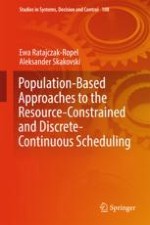This book addresses two of the most difficult and computationally intractable classes of problems: discrete resource constrained scheduling, and discrete-continuous scheduling. The first part of the book discusses problems belonging to the first class, while the second part deals with problems belonging to the second class. Both parts together offer valuable insights into the possibility of implementing modern techniques and tools with a view to obtaining high-quality solutions to practical and, at the same time, computationally difficult problems. It offers a valuable source of information for practitioners dealing with the real-world scheduling problems in industry, management and administration.
The authors have been working on the respective problems for the last decade, gaining scientific recognition through publications and active participation in the international scientific conferences, and their results are obtained using population-based methods. Dr E. Ratajczk-Ropel explores multiple agent and A-Team concepts, while Dr A. Skakovski focuses on evolutionary algorithms with a particular focus on the population learning paradigm.
